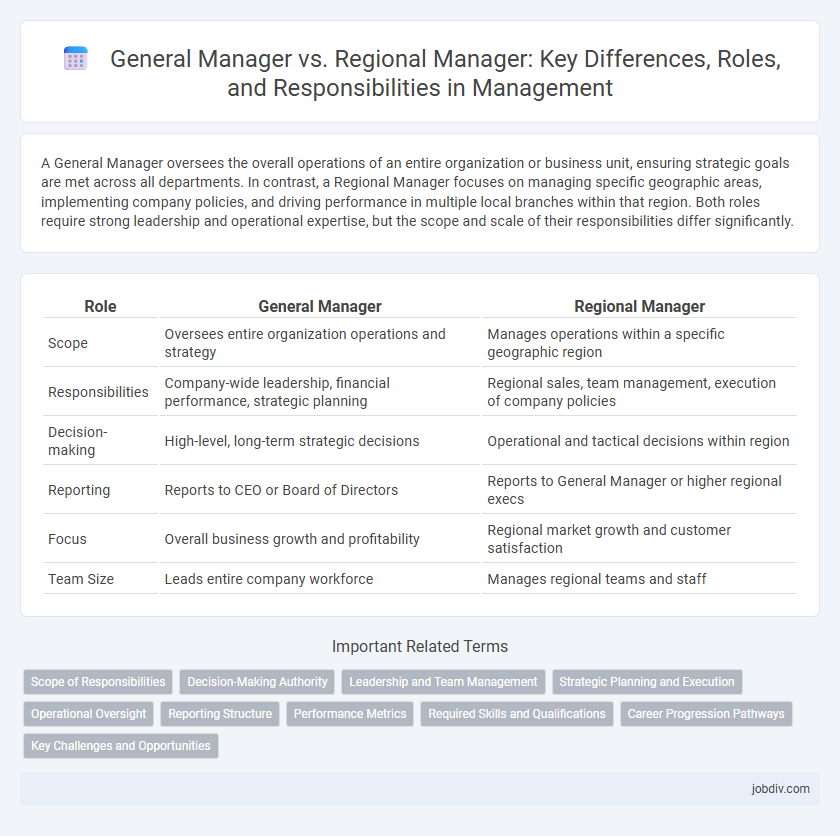A General Manager oversees the overall operations of an entire organization or business unit, ensuring strategic goals are met across all departments. In contrast, a Regional Manager focuses on managing specific geographic areas, implementing company policies, and driving performance in multiple local branches within that region. Both roles require strong leadership and operational expertise, but the scope and scale of their responsibilities differ significantly.
Table of Comparison
| Role | General Manager | Regional Manager |
|---|---|---|
| Scope | Oversees entire organization operations and strategy | Manages operations within a specific geographic region |
| Responsibilities | Company-wide leadership, financial performance, strategic planning | Regional sales, team management, execution of company policies |
| Decision-making | High-level, long-term strategic decisions | Operational and tactical decisions within region |
| Reporting | Reports to CEO or Board of Directors | Reports to General Manager or higher regional execs |
| Focus | Overall business growth and profitability | Regional market growth and customer satisfaction |
| Team Size | Leads entire company workforce | Manages regional teams and staff |
Scope of Responsibilities
A General Manager oversees the entire organization, managing multiple departments such as sales, operations, finance, and human resources to ensure alignment with overall company goals. In contrast, a Regional Manager focuses on a specific geographic area, directing branch managers and sales teams to optimize performance and market penetration within that region. The General Manager's role is broader in scope, encompassing strategic planning and company-wide decision-making, while the Regional Manager concentrates on tactical execution and local market management.
Decision-Making Authority
A General Manager holds broader decision-making authority, overseeing multiple departments across an entire organization or business unit, while a Regional Manager's decision-making is confined to the operations within a specific geographic area. The General Manager sets strategic priorities, allocates resources, and approves high-level policies impacting the overall company performance. Regional Managers implement these strategies locally, adjust tactics to regional market conditions, and make operational decisions to meet targets within their assigned region.
Leadership and Team Management
A General Manager oversees overall organizational operations, setting strategic goals and leading cross-functional teams to ensure company-wide alignment and performance. A Regional Manager focuses on managing multiple locations within a specific geographic area, emphasizing local team leadership, operational efficiency, and market-specific strategies. Both roles require strong leadership skills, but the General Manager prioritizes broad organizational vision while the Regional Manager concentrates on tactical execution and regional team development.
Strategic Planning and Execution
General Managers oversee company-wide strategic planning and execution, ensuring alignment across all departments to achieve organizational goals. Regional Managers focus on implementing those strategic plans within specific geographic areas, adapting tactics to local market conditions and operational requirements. Effective management requires coordination between both roles to drive cohesive strategy execution and performance optimization.
Operational Oversight
A General Manager oversees the entire organization's operations, ensuring strategic alignment and resource allocation across multiple departments. A Regional Manager focuses on operational execution within a specific geographic area, managing local teams and implementing corporate policies on the ground. Operational oversight by a General Manager involves broader decision-making and long-term planning, while a Regional Manager emphasizes day-to-day management and performance metrics within their region.
Reporting Structure
The General Manager typically reports directly to the CEO or Board of Directors and oversees broad organizational operations across multiple regions or departments. In contrast, the Regional Manager reports to the General Manager or higher-level executives and focuses on implementing strategies within a specific geographic area. This hierarchical reporting structure ensures alignment of regional goals with overall corporate objectives and facilitates efficient decision-making.
Performance Metrics
General Managers are typically evaluated on overall company profitability, strategic goal achievement, and cross-departmental efficiency, reflecting their responsibility for total business operations. Regional Managers focus on performance metrics tied to their specific geographic areas, such as regional sales growth, market penetration, and local customer satisfaction scores. Key performance indicators for both roles include revenue targets, operational cost control, and team productivity, but the scope of impact differs significantly between company-wide and region-specific management.
Required Skills and Qualifications
General Managers require strong leadership skills, extensive experience in strategic planning, financial management, and cross-departmental coordination, often holding an MBA or equivalent degree. Regional Managers need expertise in market analysis, sales management, and operational oversight within specific territories, typically backed by a bachelor's degree in business or related fields. Both roles demand excellent communication, problem-solving abilities, and adaptability to drive organizational success at different levels.
Career Progression Pathways
Career progression pathways differ significantly between General Managers and Regional Managers, with General Managers often advancing through cross-functional leadership roles and strategic project management to oversee entire organizations or business units. Regional Managers typically climb the ladder by excelling in territory-specific performance, sales management, and operational oversight, preparing them to manage multiple locations within a defined geographic area. Both roles require strong leadership, but General Managers focus on broader organizational strategy while Regional Managers emphasize localized operational execution and team development.
Key Challenges and Opportunities
General Managers face the challenge of overseeing comprehensive business operations, aligning diverse departments, and driving overall company growth while managing high-level strategic initiatives. Regional Managers encounter the complexity of adapting corporate strategies to local markets, addressing regional customer needs, and managing teams across multiple locations under varying economic conditions. Opportunities for General Managers include shaping long-term organizational vision and leveraging cross-functional leadership, whereas Regional Managers benefit from deep market insights and agile decision-making to enhance regional performance.
General Manager vs Regional Manager Infographic

 jobdiv.com
jobdiv.com